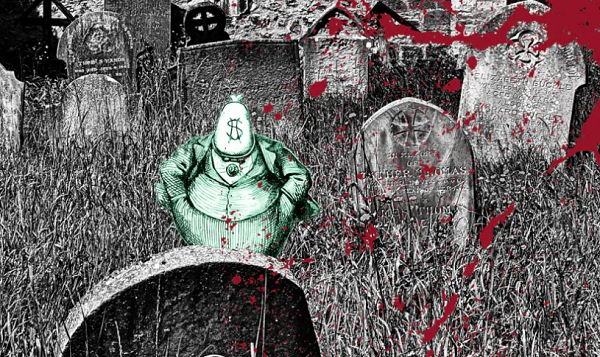Pluralistic: The long lineage of private equity’s looting
by Cory Doctorow
June 2, 2023
 Fans of the Sopranos will remember the “bust out” as a mob tactic in which a business is taken over, loaded up with debt, and driven into the ground, wrecking the lives of the business’s workers, customers and suppliers. When the mafia does this, we call it a bust out; when Wall Street does it, we call it “private equity.”
Fans of the Sopranos will remember the “bust out” as a mob tactic in which a business is taken over, loaded up with debt, and driven into the ground, wrecking the lives of the business’s workers, customers and suppliers. When the mafia does this, we call it a bust out; when Wall Street does it, we call it “private equity.”
It used to be that we rarely heard about private equity, but then, as national chains and iconic companies started to vanish, this mysterious financial arrangement popped up with increasing frequency. When a finance bro’s presentation on why Olive Garden needed to be re-orged went viral, there was a lot of snickering about the decline of a tacky business whose value prop was unlimited carbs. But the bro was working for Starboard Value, a hedge fund that specialized in buying out and killing off companies, pocketing billions while destroying profitable businesses.
https://www.salon.com/2014/09/17/the_real_olive_garden_scandal_why_greedy_hedge_funders_suddenly_care_so_much_about_breadsticks/
Starboard Value’s game was straightforward: buy a business, load it with debt, sell off its physical plant – the buildings it did business out of – pay itself, and then have the business lease back the buildings, bleeding out money until it collapsed. They pulled it with Red Lobster, and the point of the viral Olive Garden dis track was to soften up the company for its own bust out.
The bust out tactic wasn’t limited to mocking middlebrow family restaurants. For years, the crooks who ran these ops did a brisk trade in blaming the internet. Why did Sears tank? Everyone knows that the 19th century business was an antique, incapable of mounting a challenge in the age of e-commerce. That was a great smokescreen for an old-fashioned bust out that saw corporate looters make off with hundreds of millions, leaving behind empty storefronts and emptier pension accounts for the workers who built the wealth the looters stole:
https://prospect.org/economy/vulture-capitalism-killed-sears/
Same goes for Toys R Us: it wasn’t Amazon that killed the iconic toy retailer – it was the PE bosses who extracted $200m from the chain, then walked away, hands in pockets and whistling, while the businesses collapsed and the workers got zero severance:
https://www.washingtonpost.com/news/business/wp/2018/06/01/how-can-they-walk-away-with-millions-and-leave-workers-with-zero-toys-r-us-workers-say-they-deserve-severance/
It’s a good racket – for the racketeers. Private equity has grown from a finance sideshow to Wall Street’s apex predator, and it’s devouring the real economy through a string of audacious bust outs, each more consequential and depraved than the last.
As PE shows that it can turn profitable businesses into gigantic windfalls, sticking the rest of us with the job of sorting out the smoking craters they leave behind, more and more investors are piling in. Today, the PE sector loves a rollup, which is when they buy several related businesses and merge them into one firm. The nominal business-case for a rollup is that the new, bigger firm is more “efficient.” In reality, a rollup’s strength is in eliminating competition. When all the pet groomers, or funeral homes, or urgent care clinics for ten miles share the same owner, they can raise prices, lower wages, and fuck over suppliers.
They can also borrow. A quirk of the credit markets is that a standalone small business is valued at about 3-5x its annual revenues. But if that business is part of a large firm, it is valued at 10-20x annual turnover. That means that when a private equity company rolls up a comedy club, ad agency or water bottler (all businesses presently experiencing PE rollup), with $1m in annual revenues, it shows up on the PE company’s balance sheet as an asset worth $10-20m. That’s $10-20m worth of collateral the PE fund can stake for loans that let it buy and roll up more small businesses.
2.9 million Boomer-owned businesses, employing 32m people, are expected to sell in the next couple years as their owners…
[READ THE COMPLETE ARTICLE HERE]
